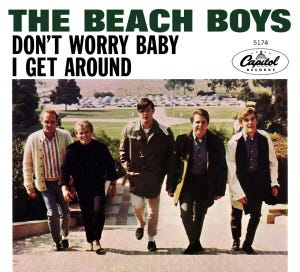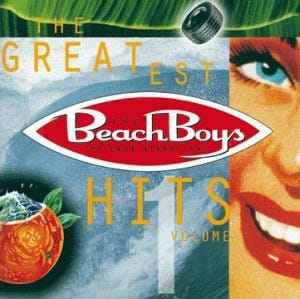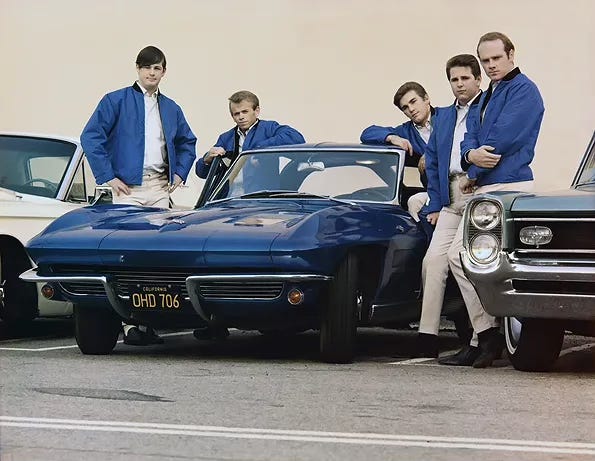The Hydrogen Jukebox: "Don't Worry Baby:"
Mourning Brian Wilson by reflecting on my pick for his greatest work.
Like, well, like probably everyone in the United States at least, The Beach Boys were a constant in my life from the very beginning. One of my first CDs was this greatest hits compilation, which I wore out from repeated listens:
Because the group was such a part of my life’s soundtrack, I stopped in my tracks when the news broke: Brian Wilson, the main creative force behind The Beach Boys, had died at 82. It wasn’t a shock—he was 82 and had long struggled with physical and mental health—but it still stopped me in my tracks.
I don’t remember exactly when I realized the extent of Brian Wilson’s genius—or that The Beach Boys weren’t just the “Surfin’ U.S.A.” and “California Girls” band. But it’s a moment for every Beach Boys listener when they realize the level of depth and artistry that exists within the group’s music. That power came primarily from Wilson and made The Beach Boys not just a group that produced fun songs about cars and surfing and girls but also a weight like you might hear in songs of the same time by the Beatles and The Rolling Stones.
There’s the moment when you realize the magnitude of the Pet Sounds album, understanding that Wilson created something on par with the Beatles’ Revolver and Sgt. Pepper in terms of expanding what was possible through popular music. “Wouldn’t It Be Nice” and “I Just Wasn’t Made for These Times” are tracks with an emotional depth—a sorrow or wistfulness—that goes beyond the simplicity of most pop music of that time, while being sonically inventive in totally shocking ways. I haven’t fully explored the post-Pet Sounds era, but The Smile Sessions and the early ’70s reissues are in my queue and will be getting some attention.
But when I think about the greatness of Brian Wilson, as a composer and writer par excellence, my mind goes to a song I probably heard (and overlooked) during my initial listens to The Beach Boys but as I got older it came to be one of my favorite songs, not just by the Beach Boys but of all-time. In my estimation, “Don’t Worry Baby” is one of the greatest songs in the history of popular music. If I were to have a Pantheon, a Mount Rushmore, a Mount Olympus of songs, “Don’t Worry Baby” would almost certainly be in there.
“Don’t Worry Baby” is, quite explicitly, a continuation of the work of Phil and Ronnie Spector on “Be My Baby” (Wilson even submitted “Don’t Worry Baby” to the Ronettes for them to perform it, but they passed and the rest was history). “Be My Baby” had an outsized influence on Wilson, nudging him from simple surf songs toward more complex, emotionally rich terrain. There’s a whole section on the Wikipedia page for “Be My Baby” on its effect on Brian Wilson. It’s also one of the greatest songs in the annals of popular music (I would argue it’s a kind of genesis/alpha point for everything that came after, but I’ll save that discussion for another day).
There are the sonic echoes, the drum part to begin the song as well as the structure of the song and the chorus in particular, while the lyrics to both songs reflect the storminess of emotions of youth. But while “Be My Baby” has an intensity—the power of Spector’s Wall of Sound, the intensity of the feeling being expressed--Wilson gives “Don’t Worry Baby” such a warm and sweetness. “Be My Baby” is what it feels like inside while “Don’t Worry Baby” is what we want in its peace and comfort and reassurance. The instrumentation on “Don’t Worry Baby” is much more subdued and calm, not possessing the same overwhelming force as the music on “Be My Baby.” The vocal harmonies on “Don’t Worry Baby” are absolutely amazing too, not surprisingly.
There’s also a level of subversion and challenging of masculine stereotypes that makes “Don’t Worry Baby” really stand out. The narrator of the song is someone on the hot rod circuit and prone to “brag about my car.” But rather than being overconfident, our narrator is worried and possesses a palpable sense of anxiety:
I don't know why, but I keep thinking
Something's bound to go wrong
[…]
I can't back down now because
I pushed the other guys too far
Instead of the clenched-fist ideal of ’60s masculinity, our narrator expresses fear, vulnerability, and ultimately the comfort he finds in his partner.
The final verse really puts a point on that:
She told me, "Baby, when you race today
Just take along my love with you
And if you knew how much I loved you, baby
Nothing could go wrong with you"
Oh, what she does to me
When she makes love to me
It’s not a song about strength, about how much better this guy is or how much better his car is. It’s about his own worry, his weakness, and the strength he gets from the support from his partner. For a popular song released in the mid-1960s, that’s a pretty complex and interesting thing to articulate.
It’s that emotional depth, dramatizing feelings that one doesn’t expect to see in the uber-masculine world of cars and racing, that makes me think “Don’t Worry Baby” even surpasses its inspiration in “Be My Baby.” It certainly sets the stage for a Bruce Springsteen song like “Racing in the Street,” which is a darker and more realistic view into a similar scene. But “Don’t Worry Baby” was the first song I thought of after hearing the news of Wilson’s passing, and is my pick for his greatest work. If that was all he’d done, it would be enough to be considered one of the greats. But then you look at all the other great, great songs he’s responsible for… and you realize what a loss this is.









It’s always struck me as a prequel to a teen-death song. I don’t think the narrator is actually getting out of that race OK.